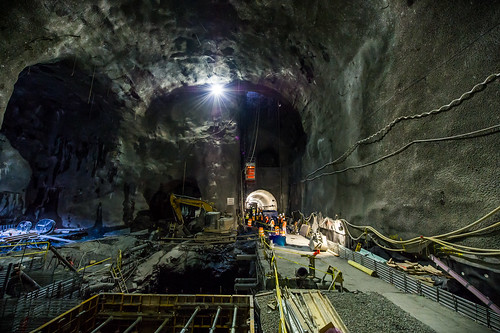 |
| The future 86th Street Station is part of the Second Avenue Subway project in New York City. |
As a photographer for the Office of Naval Research I often have the opportunity to photograph some pretty cool things. Most of the time it comes down to access. If you think about it, as photographers we are often provided access not available to the general public, so when an opportunity arises to photograph something unique, we take advantage of it.
And sometimes opportunities arise because we know the right person. That was the case recently when I had the chance to photograph the Second Avenue Subway Project currently under construction in New York City.
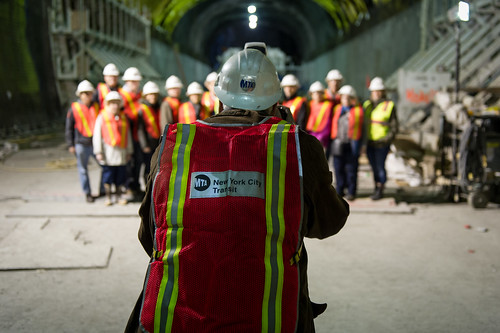 |
| A group photo of neighborhood residents affected by the construction is taken as part of their tour. |
My good friend
Patrick Cashin, Navy and Air National Guard veteran, is a photographer with the
Metropolitan Transportation Authority and is responsible for documenting all aspects of the New York transit system. Part of that documentation includes major construction projects and his recent work photographing the Second Avenue Subway Project is amazing. Pat has never been one to brag, so when he sent me an email earlier this year with a link to a f
eature that Flickr did on him, I was awed by the work and his story behind it.
 |
| While major construction and blasting is completed for phase 1 of the project, scenes like this still serve to offer a glimpse of what it takes to create new stations and subway lines. |
The very first thing that caught my eye when I saw Pat's photographs was the shear scale and size of the project and how some of the photographs he captured looked like they could have been taken 100 years ago when the first subway was built from City Hall to the Bronx.
*
So last month as I was planning my trip to New York City for Photo Plus Expo, I made plans to meet up with Pat, even if only for a quick lunch or dinner. He responded that he was also attending the expo, but the real surprise was that he asked if I would be interested in joining him on an assignment the next day photographing underground. Better yet, he had secured permission for me to photograph as well.
**
Typically only residents of the neighborhood affected by the project are given the chance to tour the project. One restriction, however, is that they are not allowed to take photographs, which is why the MTA provides a photographer to both document the tour and take a group photo.
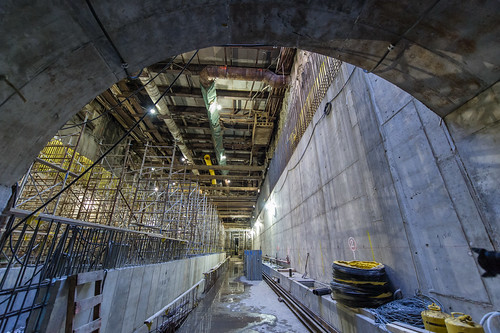 |
| View of the future 96th Street Station using the train tunnel to help frame the shot. |
There were two tours scheduled and I would be able to stay underground with Pat between those tours, giving me a total of about three hours to take photographs.
For gear I was pretty sure of two things. That it was going to be dark and that I wanted to shoot wide, so I brought with me the Nikon D3S along with two lenses, the 14-24mm and 24-70mm. And of course I also had my
Fujifilm X100S 
. I knew that light would probably be the biggest issue. I didn't bring a tripod so I relied on the high ISO capabilities of the Nikon D3S to capture the scene. The trade off of course is noise. I processed the images using Lightroom 4.0 where besides some color correction, I opened up the shadows and ran some noise reduction. But for the most part a little noise in these types of photographs does not bother me. With few exceptions I set my ISO to 3200 and everything was shot RAW.
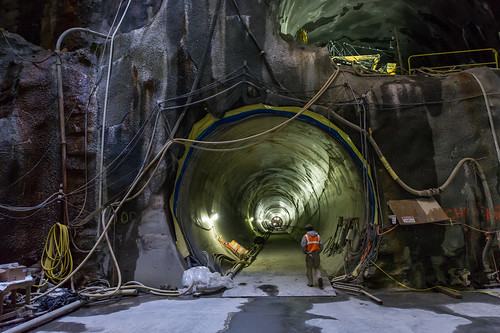 |
| Including a MTA employee in the photograph helps to show the scale of the train tunnel located at the south end of the future 86th Street Station. |
Once underground I really was struck by the size of the project, but how do you translate that in your photographs? Using a wide angle lens and including people is a great way to give the view that sense of scale. Even though this was Saturday and there was not any work going on, I was able to include a few workers who where on hand mostly for safety reasons.
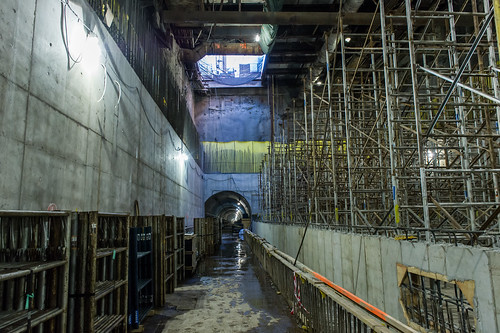 |
| An opening to street level allows natural light into the future 96th Street Station which created some challenging mixed light situations. |
Another challenge was the mixed lighting. It turned out to be a bit of daylight mixed with fluorescent and who knows what else. In situations like this I always shoot both JPEG and RAW which then gives me the option to color balance after the fact. Why both? Most of the time I never open the RAW images from an assignment. I think of the RAW files as my insurance, because in reality JPEGs just fit into my work flow allowing me to quickly download, caption and transmit. And in this case I wanted the JPEGs so I could look at and edit a few images on my iPad during the train ride back to Washington, D.C.
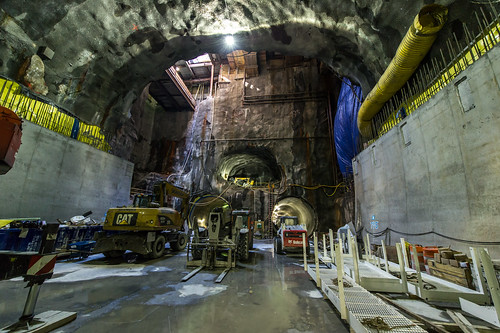 |
| Shooting wide with the Nikon 14-24mm lens allowed me to emphasize the size and scale of the project. |
Do you have friends or family that can get you access to interesting places? I bet if you think about it, you do. Also think about what you do for a living or something you have access to and if it might be interesting to a photographer friend. We tend to not think of what we do as interesting, but in many cases if you stepped back, you would realize that there might be unique opportunities all around.
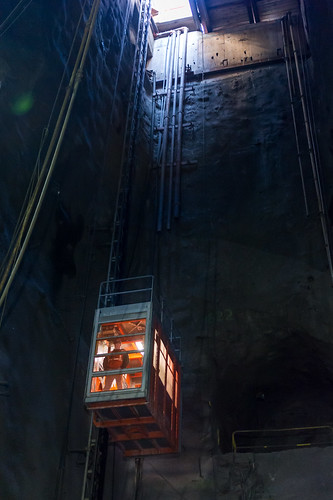 |
| An MTA employee makes the 150' trip to the surface from the future 86th Street Station. |
MTA on Flickr:
Metropolitan Transportation Authority of the State of New York
*This project was originally proposed in 1929 as a major expansion, although work never commenced due to the Great Depression. Digging for the project did begin in 1972, however it only lasted a few years before New York became insolvent. Ground breaking for the current project happened in 2007.
Phase I of the current project begins at 96th Street then runs south where is will join the existing 63rd Street Line. Additionally, three new stations will be located at 96th Street, 86th Street and 72nd Street. I entered the project via 125 foot elevator at the 86th Street location and then walked underground via the rail tunnel to the 96th Street station and back.
**In order to photograph the project I had to sign an agreement with Capitol Construction limiting my use of the photographs and while I do retain copyright, I am unable to license them for commercial use. For all inquiries about photo use, please contact Rosanna Alcala at ralcala@mtacc.info.








No comments:
Post a Comment